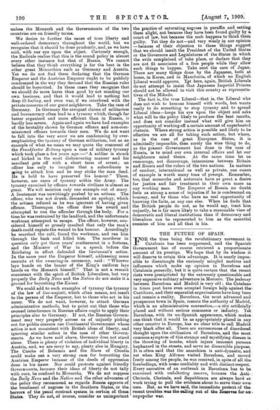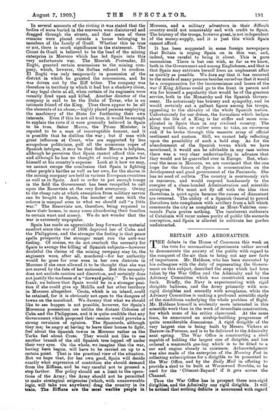THE FUTURE OF SPAIN. F OR the time being the revolutionary
movement in Catalonia has been suppressed, and the Spanish* Government has of course retrieved a proportionate amount of its prestige. We hope that by its wisdom it will deserve to retain this advantage. It is nearly impos- sible to disentangle the curiously mingled motives and influences which make up opinion in Barcelona and Catalonia generally, but it is quite certain that the recent riots were precipitated by the extremely questionable and very expensive military adventure in Morocco. The jealousy between Barcelona and Madrid is very old ; the Catalans in times past have even accepted foreign help against the Castilians, and their separatist organisations have long been and remain a reality. Barcelona, the most advanced and prosperous town in Spain, resents the authority of Madrid, which is an administrative convention,—a city artificially '• placed and without serious commerce or industry. Yet Barcelona, with its un-Spanish appearance, which makes , one think that it would be as appropriately placed in any other country in Europe, has no clear title to call Madrid very black after all. There are excrescences of disordered thought upon the civilisation of Barcelona, and the most common symptom of this strange and mystifying disease is the throwing of bombs, which injure innocent persons haphazard in the streets, and serve no discernible purpose. It is often said that the anarchism is anti-dynastic, and. vet when King Alfonso visited Barcelona, and moved freely among the people, he was received, in spite of all the. forebodings, with some cordiality and with distinct respect. Every narrative of an outbreak in Barcelona has to be examined with unfaltering reserve, because the Anti- Clericals, Clericals, and Republicans are always hard at' work trying to pull the evidence about to serve their own uses. But, as we have said, the immediate pretest. of the recent troubles was the ceiling out of the &larva' far. arr. unpopular war. In several accounts of the rioting it was stated that the bodies of nuns buried in the convents were disinterred and dragged through the streets, and that setae of these remains Were placed outside a house belonging to numbers of the family of Gruel]. Whether this be true or not, there is much significance in the statement. The Connt de Guell is believed to be the head of the mining enterprise in Morocco which has led Spain into due very' unfortunate war. The Moorish Pretender, El Roghi, granted certain concessions to the mining com- pany, which, however, the Sultan refused to confirm. El Roghi was only ternporarily in possession of the district in which he granted, the concessions, and he Was driven out by the Riff tribes, The company was therefore in territory to w,hiell it had but a shadowy claim, if any legal claim at all, when certain of its engineers were recently fired upon and killed. Another director of the company is said to be the Duke of Tovar, who is an intimate friend of the King. Thus there appear to be all the elements of an abuse,—highly placed persons employing the machinery of the State for furthering their own interests. Even if this be not all true, it would he enough to explain the riots if it were generally believed in Spain to be true. Senor Maura, the Prime Minister, is reputed to be a man of incorruptible honour, and it is possible that he dislikes the war ; but if men with great influence at Court, who are supported by less scrupulous politicians, pill all the numerous ropes of Spanish intrigue, it may be that Sefior Maura is helpless, although he perceives that Spain cannot afford this war, and although he has no thought of making a. peseta for himself at his country's expense. Look at it how we may, we cannot escape the conclusion that Spain is fighting other people's battles as well as her own, for the shares in the mining company are held in various European countries as well as in Spain. And in order to put enough troops in the field the Government has been compelled to call upon the Reservists at the very first emergency. Owing to the cheap rate at which etemption from military Service can be bought in Spain, the number of men with the colours is unequal even to what we should call "a little war." The Reservists are, therefore, being required to leave their homes, in many cases abandoning their families to certain want and misery. We do not wonder that the war is extremely unpopular.
Spain has made an appreciable leap forward in material comfort since the war of 1898 deprived her of Cuba and the Philippines, and the stronger the feeling is that peace spells prosperity the stronger must run the anti-war feeling. Of course, we do not overlook the necessity for Spain to avenge the killing of Spanish subjects—however doubtful the claims of the mining company may be, the engineers were, after all, mardered--for her authority would be gone for ever even in her own districts in Morocco if she once allowed it to be thought that she was not moved by the fate of her nationals. But this necessity does not exclude caution and discretion, and certainly does not justify the madness of a " forward policy." To be quite frank, we believe that Spain would be in a stronger posi- tion if she could give up Melilla, and her other territory in Morocco altogether. Ceuta, which is an island, could be retained, for it is obviously not open to the dangers of towns on the mainland. We daresay that what we should like to see happen is not possible, however, for Spain's Moroccan possessions are unlike the distant- Colonies of Cuba and the Philippines, and it is quite credible that any Government which proposed their cession would provoke a strong revulsion of opinion. The Spaniards, although they ma; be angry at having to leave their homes to fight, feel about the Spanish towns in Morocco rather as the Turks feel about Crete. They would not like to see another branch of the old Spanish tree lopped off under their very eyes. On the whole, we imagine that the war, having been begun, will have to be carried on up to a certain point. That is the practical view of the situation. But we hope that, for her own good, Spain will decide exactly whet expression of contrition she should demand from the Billions, and be very careful not to proceed a step farther. Her policy should set a limit to the opera- tions of the Army; the Army should not be permitted to make strategical exigencies (which, with unanswerable logic, will take you anywhere) drag the country in its. train. The- Mans are the, most warlike' people in Morocco, and a military adventure in their difficult country could not conceivably and with credit to Spain. The bravery of the troops, however great, is not independent of the money-supply, and it is just this which Spain cannot afford.
It has been suggested in some foreign newspapers that Britain is urging Spain on in this war, and, indeed, was careful to bring it about. This is pure moonshine. There is but one wish, so far as we know, both in the Government. and among Englishmen, and that is that Spain may extricate herself from an unpleasant affair as quickly as possible. We dare say that it has occurred to the minds of many persons besides ourselves that it would be a compensation for the inconvenience and losses of the war if King Alfonso could go to the front in person and win for himself a. popularity that would be of the greatest service, both to the Monarchy and the Spanish Govern- ment. He notoriously has bravery and sympathy, and he would certainly cut a gallant figure among his troops, appealing to the chivalry of the whole Spanish natiou. Unfortunately for our dream, the formalism which hedges about, the life of a Zing is far stiffer and more com- plicated iu Spain than in any civilised country. The King would take, or rather seem to take, an enormous risk if be broke through this massive array of official sentiment and custom. Still, we cannot help reflecting upon the possibility of such a bold step. As for the abandonment of the Spanish towns which we have mentioned, it would net be advisable in any case unless there was a very clear understanding in advance that they would not be quarrelled over in Europe. But, what- ever the issue in Morocco, we are convinced that the one hope for the future of Spain is concentration on the development and good government of the Peninsula. She has no need of outlets. The country is enormously rich in resources, and would respond handsomely to the euergies of a clean-handed Administration and scientific enterprise. We must not fly off with the idea that Barcelona is quiet again because the causes of discontent are removed. The ability of a Spanish General to pound. Barcelona into compliance with artillery from a. hill w,hicli commands the city as completely as Mont-Valerian com- mands Paris proves nothing. The incoherent outbursts of Catalonia will recur unless purity of public life succeeds corruption, and Spain is allowed to cultivate her garden undistracted.







































 Previous page
Previous page